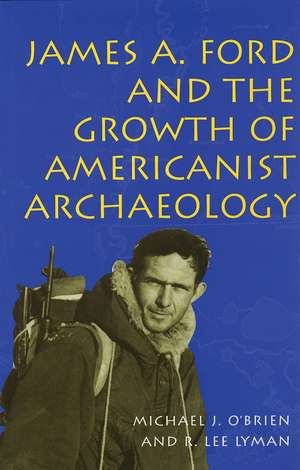James A. Ford and the Growth of Americanist Archaeology
Autor Michael J. O'Brien, R. Lee Lymanen Limba Engleză Hardback – 25 noi 1998
Until James A. Ford's death in 1968, no archaeologist in the United States commanded the same degree of respect among his colleagues. Many may not have agreed with him, but they respected him. A brilliant archaeologist and dynamic personality, Ford found himself at the center of some of the most provocative debates in Americanist archaeology.
James A. Ford and the Growth of Americanist Archaeology tells the story of Ford's role in the development of culture history, the dominant paradigm in the field from roughly 1914 to 1960. By studying Ford's life and the major part he played in the rise and fall of culture history, authors Michael J. O'Brien and R. Lee Lyman explore the underpinnings of the paradigm.
Culture history—unraveling the history of prehistoric cultures—consisted of a fairly coherent body of perspectives and methods. This volume provides a fascinating glimpse of how archaeologists began using a variety of methods and units to attain spatial and temporal control over an exceedingly diverse and complex archaeological record. During Ford's era, most archaeologists viewed time as a series of distinct segments. Ford, the chief proponent of the minority view, saw time as a continuum that could be divided into any number of units; he believed the boundaries between temporal units to be strictly arbitrary.
The particular methods worked out by Ford in the Southeast to deal with time received broad notice and extensive use by culture historians. His substantial contributions to culture history and his influence on an entire generation of scholars who adhered to the paradigm ensnared Ford in culture history's inconsistencies. By the 1950s, when archaeologists began recognizing flaws in the paradigm, Ford was singled out for criticism.
The absence of critical examinations of Ford's work has led to a false impression of his contributions to the field. James A. Ford and the Growth of Americanist Archaeology provides perspective for fully appreciating Ford's accomplishments. No one else working in the lower Mississippi Valley at the time even approached the level of commitment to or knowledge of the region that Ford possessed.
To understand the state of Americanist archaeology today requires an understanding of what culture history embodies. James A. Ford and the Growth of Americanist Archaeology presents a thorough examination of the culture-history paradigm through a unique biographical approach. Students and scholars of archaeology and the history of archaeology will benefit from this refreshing work.
James A. Ford and the Growth of Americanist Archaeology tells the story of Ford's role in the development of culture history, the dominant paradigm in the field from roughly 1914 to 1960. By studying Ford's life and the major part he played in the rise and fall of culture history, authors Michael J. O'Brien and R. Lee Lyman explore the underpinnings of the paradigm.
Culture history—unraveling the history of prehistoric cultures—consisted of a fairly coherent body of perspectives and methods. This volume provides a fascinating glimpse of how archaeologists began using a variety of methods and units to attain spatial and temporal control over an exceedingly diverse and complex archaeological record. During Ford's era, most archaeologists viewed time as a series of distinct segments. Ford, the chief proponent of the minority view, saw time as a continuum that could be divided into any number of units; he believed the boundaries between temporal units to be strictly arbitrary.
The particular methods worked out by Ford in the Southeast to deal with time received broad notice and extensive use by culture historians. His substantial contributions to culture history and his influence on an entire generation of scholars who adhered to the paradigm ensnared Ford in culture history's inconsistencies. By the 1950s, when archaeologists began recognizing flaws in the paradigm, Ford was singled out for criticism.
The absence of critical examinations of Ford's work has led to a false impression of his contributions to the field. James A. Ford and the Growth of Americanist Archaeology provides perspective for fully appreciating Ford's accomplishments. No one else working in the lower Mississippi Valley at the time even approached the level of commitment to or knowledge of the region that Ford possessed.
To understand the state of Americanist archaeology today requires an understanding of what culture history embodies. James A. Ford and the Growth of Americanist Archaeology presents a thorough examination of the culture-history paradigm through a unique biographical approach. Students and scholars of archaeology and the history of archaeology will benefit from this refreshing work.
Preț: 355.97 lei
Nou
Puncte Express: 534
Preț estimativ în valută:
68.15€ • 71.10$ • 57.12£
68.15€ • 71.10$ • 57.12£
Carte indisponibilă temporar
Doresc să fiu notificat când acest titlu va fi disponibil:
Se trimite...
Preluare comenzi: 021 569.72.76
Specificații
ISBN-13: 9780826211842
ISBN-10: 0826211844
Pagini: 400
Ilustrații: 96 illus, tables, maps
Dimensiuni: 156 x 235 x 30 mm
Greutate: 0.74 kg
Ediția:First Edition
Editura: University of Missouri Press
Colecția University of Missouri
ISBN-10: 0826211844
Pagini: 400
Ilustrații: 96 illus, tables, maps
Dimensiuni: 156 x 235 x 30 mm
Greutate: 0.74 kg
Ediția:First Edition
Editura: University of Missouri Press
Colecția University of Missouri
Notă biografică
Michael J. O'Brien is Professor of Anthropology at the University of Missouri-Columbia, where he is also Director of the Museum of Anthropology and Associate Dean for the College of Arts and Science. He is the author of numerous books, including The Prehistory of Missouri (University of Missouri Press).
R. Lee Lyman is Professor of Anthropology at the University of Missouri-Columbia. He is the author or editor of several books, including Americanist Culture History: Fundamentals of Time, Space, and Form, The Rise and Fall of Culture History, and Prehistory of the Oregon Coast.
R. Lee Lyman is Professor of Anthropology at the University of Missouri-Columbia. He is the author or editor of several books, including Americanist Culture History: Fundamentals of Time, Space, and Form, The Rise and Fall of Culture History, and Prehistory of the Oregon Coast.
